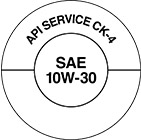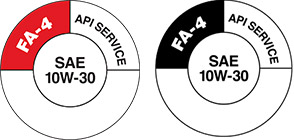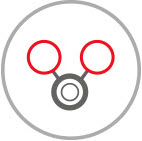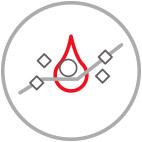
Find your Country and language
Lubricants Beyond Today's Standards TM
Petro-Canada™ Lubricants' distribution network extends to over 80 countries worldwide
PC-11 becomes API CK-4 and FA-4
PC-11 (Proposed Category 11) has been the biggest change in heavy duty diesel engine oils in a decade. The demands of PC-11 and new category tests have been the driving force behind the development of DURON Next Generation.
Now, PC-11 has become the two new categories that will define heavy duty engine oils for years to come:

API CK-4
Improved performance and backwards-compatible for older engines

API FA-4
Primarily for use in the next generation of advanced diesel engines
Why are the changes happening?
API CK-4 and FA-4 are driven by legislative changes and the world’s engine manufacturers, who must:
API CK-4 describes oils for use in diesel engines designed to meet 2017 model year on-road and Tier 4 non-road exhaust emission standards, as well as for previous model year diesel engines.
API CK-4 will offer backwards compatibility to the previous categories (CJ-4, CI-4+, etc), allowing use in the vast majority of older diesel engine vehicles while offering increased performance and protection gains, as well as extending the intervals required between oils changes.
What are the performance advantages?
These oils are designed to provide enhanced protection against oxidation, viscosity loss due to shearing, and oil aeration as well as protection against catalyst poisoning, particulate filter blocking, engine wear, piston deposits, degradation of low- and high-temperature properties, and soot-related viscosity increase.
API CK-4 oils are especially effective at sustaining emission control system durability where particulate filters and other advanced after-treatment systems are used.
PC-11 will not affect every business the same and some may only see a small impact. For example, a business that operates with older equipment and different engine types may simply need to transition from the current API CJ-4 oils to CK-4 oils. This is most likely to apply to off-road fleets used in environments such as mining and construction.
At Petro-Canada Lubricants, we see this as not only an opportunity to improve the efficiency and carbon footprint of businesses, but also a chance to recognize the potential to cut costs and increase the profitability of operations. As with all business decisions, clear understanding and early adoption could result in a genuine competitive edge.
For those businesses with a mix of older and newer equipment and an ambition to realize the improvements that will come with PC-11, then a stock of both API CK-4 and FA-4 products may be best.
API FA-4 is the brand new category for oils. It will not be interchangeable with older oils, and will have limited backwards compatibility with older engines. It is advisable to consult with your OEM to determine suitability with your engine.
API FA-4 describes certain XW-30 oils specifically formulated for use in select high-speed four-stroke diesel engines designed to meet 2017 model year on-highway greenhouse gas (GHG) emission standards.
The formulations
API FA-4 is specifically designed for some newer vehicles. FA-4 oils will have a considerably lower viscosity, meaning less friction and less viscous drag in the engine, and deliver a reduction in fuel consumption, while still offering increased levels of wear protection. Future heavy duty fleet vehicles may be designed to comply with this specification to offer even higher levels of efficiency. Many OEMs have yet to decide their level of engagement with this type of oil.
What are the performance advantages?
API FA-4 oils are designed to provide enhanced protection against oxidation, viscosity loss due to shearing, and oil aeration as well as protection against catalyst poisoning, particulate filter blocking, engine wear, piston deposits, degradation of low- and high-temperature properties, and soot-related viscosity increase.
The guidance on API FA-4 use should be heeded: Refer to engine manufacturer recommendations to determine if API FA-4 oils are suitable for use in your engine.
For engines to meet the emissions, efficiency and fuel economy goals of the future, they’ll need the help of the next generation of oils.
To meet the standards of API CK-4 and FA-4, those oils must pass some tough new tests. Watch John Pettingill Petro-Canada Lubricants Research & Development Product Specialist explain what they are and how they can impact your engine.

Oxidation control
Oxidation leads to decreasing engine protection, lower fuel efficiency and fewer miles between oil drains.

Aeration control
Aeration directly affects oil performance, potentially causing engine wear, poor oil performance, and ultimately, greater operating costs.

Shear stability
Shearing of the engine oil can mean oil becomes thinner and less protective to the engine.
What is oxidation? Oxidation – a chemical reaction of oil with oxygen (from air) – significantly degrades and thickens lubricants over time. It is accelerated by high stress operation conditions such as high temperatures. Oxidation control is becoming increasingly important, as advanced heavy duty engines are designed to run hotter in the drive for higher performance and efficiency.
Why does it matter? Oxidation leads to increasing oil viscosity and deposit formation, which results in reduced ability to flow, thus decreasing engine protection and negatively impacting engine fuel efficiency.
How the new DURON handles oxidation. We’re formulating DURON Next Generation with outstanding oxidation resistance, to make DURON highly resistant to degradation even under high stress conditions. That means outstanding wear protection, even in really hot-running engines.
What is aeration? Aeration is not a chemical reaction but a physical process in which small bubbles of air as a foam become trapped in the lubricant.
Why does it matter? Aeration directly affects the intended lubrication properties of an oil. A high level of entrapped air will degrade the ability of the oil film to protect engine parts, potentially causing engine wear and ultimately meaning greater costs for operators.
How the new DURON handles aeration. DURON Next Generation meets or even exceeds the new category requirements for aeration control. That mean better long-term engine protection, so your engines work more and need maintaining less.
What is shear stability? Multigrade engine oils are formulated with viscosity modifiers – large molecules which control oil viscosity (which thus provide engine protection) under different operating temperatures. Under stress, these molecules may ‘shear’, affecting their ability to control viscosity.
Shear stability is a measure of the ability of an oil to stay in SAE viscosity grade i.e. SAE 40 stays as an SAE 40.
Why does it matter? The viscosity characteristics of any oil are precisely matched to the application and operating conditions it is recommended for. Shearing of the viscosity modifiers means the oil can become thinner and less protective, i.e. an SAE 40 grade could drop down to SAE 30.
How the new DURON handles shear stability. The introduction of new shear-resistant components significantly improves new DURON’s resistance to shearing – even in the latest heavy duty diesel engines. With the durability to stay in grade, new DURON promises better long-term protection and better economy through the use of lower viscosity oil.

Top innovation award for PCLI’s DURON™ product line Roadway covers the news that Petro-Canada Lubricants received the Fro...
ReadNews